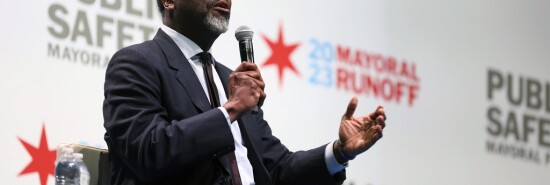
Brandon Johnson fails his first ‘big test’ as mayor
Jack Elbaum
Video Embed
Last Thursday, Chicago Mayor Brandon Johnson held an event with law enforcement personnel and other “community leaders” to unveil his Memorial Day weekend “safety plan.” Holiday weekends in Chicago are notoriously violent, so Johnson’s attempt to curb it constituted his first “big test” as mayor.
The consistent and senseless violence on holiday weekends is also why it was disappointing to hear so little substance during the event. Johnson briefly discussed how the Office of Emergency Management and Communications would “monitor citywide events and weather conditions” and all relevant agencies would coordinate with one another. He also tweeted that Chicago police “will increase its presence this weekend.” But, as I wrote at the time, “there are no real indications that Johnson is doing anything different than his predecessors.”
BIDEN NEEDS TO SHELVE TAX INCREASES AND FOCUS ON SPENDING
Tragically, the outcome of the weekend was no different, either. In fact, it may have even been worse. This was entirely predictable, as Johnson’s “plan” included nothing that would suggest a new path was being charted. Rather, it was an implicit acceptance of the violence, presented in the way it was so that Johnson could claim that at least he tried.
By the end of the weekend, 57 people were shot, and 11 were killed. According to local outlets, “The shooting victims range in age from 2 to 77 years old, representing every part of the city.” The Chicago Sun-Times noted this was the worst death toll since 2015.
Additionally, no suspects have been arrested.
Reading the descriptions of the violence, it is impossible not to notice how pointless and unnecessary each and every shooting is. A 16-year-old girl was shot while standing on the sidewalk; a bullet grazed a 14-year-old girl; a man and woman in their 30s were shot, one fatally, while sitting in their car; a 77-year-old man was shot in the back; and a 22-year-old man was shot in the face while in his house. There are many, many more examples just like these — victims in their teens, 20s, and 30s who have so much more life to live. True tragedy. Yet most of the country never hears about it because it is, more often than not, only local outlets that cover the violence.
When asked about the shootings, Johnson said, “Poverty didn’t go away over the weekend. Like we understand that when communities have been disinvested in and traumatized, you are going to see the manifestation of that trauma.”
This answer is a cop-out to avoid responsibility for his failing policies. It is certainly true that there is far too much poverty and that trauma is in the air in many Chicago communities filled with gun violence. At the same time, Johnson has the cause-and-effect backward. One need not wait until every communal problem is alleviated to see a reduction in crime. Rather, reducing crime is actually a prerequisite to real investment in communities and people being lifted out of poverty.
Businesses are rational actors, and so they will not open in a place where they believe they may get robbed or be in close proximity to violent crime. As such, it is necessary to create a business atmosphere conducive to investment. That is the only way businesses, along with the economic benefits for the community that come with them, will ever begin to move in. The first step in creating that atmosphere is to stop crime.
And, contrary to Johnson’s suggestion, this is possible to do without first eliminating poverty. In New York City, for example, the poverty rate actually increased between 1990 and 2000 — which is the same period when crime fell dramatically. Additionally, common sense tells us that only a tiny proportion of people in high-crime and low-income neighborhoods are actually committing crimes. The vast, vast majority of people in poverty do not commit crimes. So the idea that reducing poverty is a prerequisite to reducing crime, not the other way around, doesn’t even pass the smell test. When it comes to crime, the problem is quite concentrated. Thus, the response should be concentrated as well.
The formula I am suggesting is this: take decisive action, based on policy that has worked in the past, to stop violent crime. This means increasing police presence in the areas where the most crime happens — in contrast to the current approach in which “officers won’t be moved to one neighborhood at the expense of other neighborhoods” — and actually prosecuting criminals so that they remain off the street. Significant research shows that this can reduce crime, which creates an atmosphere where more businesses would be able to operate — producing economic opportunity and lifting people out of poverty.
CLICK HERE TO READ MORE FROM THE WASHINGTON EXAMINER
Of course, much more must be done. For example, investing in significant education reform is important for preparing future generations to succeed and steer them away from violence. The charter school system in New York City provides a good model of what that may look like.
To have conversations about any of this, though, will require real leadership on the part of people like Johnson. Refusing to take real action, leading to outcomes like we saw this weekend, will simply not cut it — and the people of Chicago will continue to pay the price.
Jack Elbaum is a summer 2023 Washington Examiner fellow.
